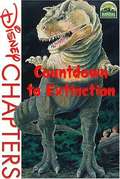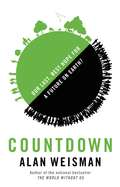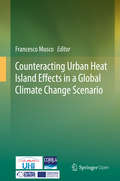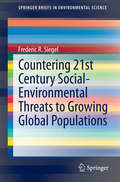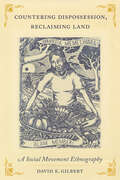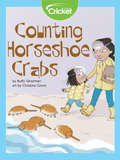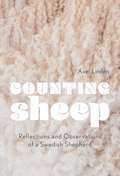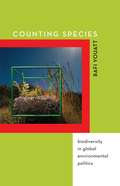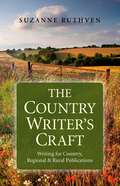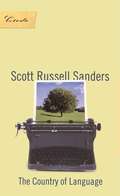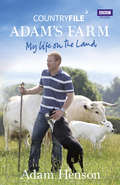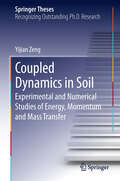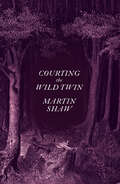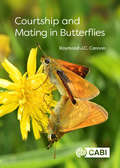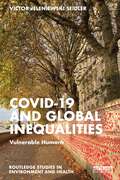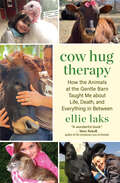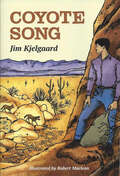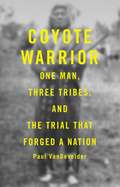- Table View
- List View
Countdown to Extinction
by Barbara Gaines WinkelmanChildren's book about the study and research into dinosaurs that have become extinct.
Countdown: Our Last, Best Hope for a Future on Earth?
by Alan WeismanA powerful investigation into the chances for humanity's future from the author of the bestseller The World Without Us.In his bestselling book The World Without Us, Alan Weisman considered how the Earth could heal and even refill empty niches if relieved of humanity's constant pressures. Behind that groundbreaking thought experiment was his hope that we would be inspired to find a way to add humans back to this vision of a restored, healthy planet-only in harmony, not mortal combat, with the rest of nature.But with a million more of us every 4¿ days on a planet that's not getting any bigger, and with our exhaust overheating the atmosphere and altering the chemistry of the oceans, prospects for a sustainable human future seem ever more in doubt. For this long awaited follow-up book, Weisman traveled to more than 20 countries to ask what experts agreed were probably the most important questions on Earth--and also the hardest: How many humans can the planet hold without capsizing? How robust must the Earth's ecosystem be to assure our continued existence? Can we know which other species are essential to our survival? And, how might we actually arrive at a stable, optimum population, and design an economy to allow genuine prosperity without endless growth?Weisman visits an extraordinary range of the world's cultures, religions, nationalities, tribes, and political systems to learn what in their beliefs, histories, liturgies, or current circumstances might suggest that sometimes it's in their own best interest to limit their growth. The result is a landmark work of reporting: devastating, urgent, and, ultimately, deeply hopeful.By vividly detailing the burgeoning effects of our cumulative presence, Countdown reveals what may be the fastest, most acceptable, practical, and affordable way of returning our planet and our presence on it to balance. Weisman again shows that he is one of the most provocative journalists at work today, with a book whose message is so compelling that it will change how we see our lives and our destiny.
Counteracting Urban Heat Island Effects in a Global Climate Change Scenario
by Francesco MuscoUrban heat islands are a new type of microclimatic phenomenon that causes a significant increase in the temperature of cities compared to surrounding areas. The phenomenon has been enforced by the current trend towards climate change. Although experts consider urban heat islands an urgent European Union public health concern, there are too few policies that address it. The EU carried out a project to learn more about this phenomenon through pilot initiatives. The pilots included feasibility studies and strategies for appropriately altering planning rules and governance to tackle the problem of urban heat islands. The pilots were carried out in eight metropolitan areas: Bologna/Modena, Budapest, Ljubljana, Lodz, Prague, Stuttgart, Venice/Padova, and Vienna. The feasibility studies carried out in these pilot areas focused on the specific morphology of EU urban areas, which are often characterised by the presence of historical old towns.
Countering 21st Century Social-Environmental Threats to Growing Global Populations (SpringerBriefs in Environmental Science)
by Frederic R. SiegelThis book brings together in a single volume a grand overview of solutions - political, economic, and scientific - to social and environmental problems that are related to the growth of human populations in areas that can least cope with them now. Through progressive adaptation to social and environmental changes projected for the future, including population growth, global warming/climate change, water deficits, and increasing competition for other natural resources, the world may be able to achieve a fair degree of sustainability for some time into the future.
Countering Dispossession, Reclaiming Land: A Social Movement Ethnography
by David E. GilbertTwo decades ago, a group of Indonesian agricultural workers began occupying the agribusiness plantation near their homes. In the years since, members of this remarkable movement have reclaimed collective control of their land and cultivated diverse agricultural forests on it, repairing the damage done over nearly a century of abuse. Countering Dispossession, Reclaiming Land is their story. David E. Gilbert offers an account of the ways these workers-turned-activists mobilized to move beyond industrial agriculture's exploitation of workers and the environment, illustrating how emancipatory and ecologically attuned ways of living with land are possible. At a time when capitalism has remade landscapes and reordered society, the Casiavera reclaiming movement stands as an inspiring example of what struggles for social and environmental justice can achieve.
Counting Horseshoe Crabs
by Buffy SilvermanJenny has read all about horseshoe crabs and is excited to visit the beach and count them with her mom. By counting the horseshoe crabs, Jenny is helping scientists to protect the crabs that are migrating. She learns how the horseshoe crab migration can even benefit migrating shorebirds. When Jenny grows up, she definitely wants to be a scientist!
Counting Pumpkins
by Ellen SenisiJoin two friends counting pumpkins— and find a surprise at the end!
Counting Sheep: Reflections and Observations of a Swedish Shepherd
by Axel LindénNorwegian Wood meets The Tao of Pooh in this philosophical, witty, and heartwarming collection of daily observations from a Swedish academic-turned-sheep farmer who finds peace and meaning outside the hustle and bustle of modern, urban life. One of the fun things about keeping sheep is that now and then it feels like something other than a job or a duty. Perhaps the feeling can best be summed up by the idea that it’s not I who keep the sheep, but the sheep who keep me. When Axel Lindén leaves his literary life in the city for the farm he unexpectedly inherits—along with the ever-escaping flock of sheep that comes with it—he has a fairly naïve notion of what farm life will be: pure drudgery. But as time passes and Axel slowly settles into the rhythms of the farm and shepherding, his naiveté fades away and is gradually replaced with a new appreciation of the spiritual and emotional value of manual labor, caring for other living things, and staying connected to the earth. Capturing his observations and thoughts in short diary entries, Counting Sheep is a meditative and irresistibly delightful book that delves into the small wonders of our world and celebrates pastoral life, demonstrating that it’s often the little things in life that mean the most.
Counting Species: Biodiversity in Global Environmental Politics
by Rafi YouattThree decades of biodiversity governance has largely failed to stop the ongoing environmental crisis of global species loss. Yet that governance has resulted in undeniably important political outcomes. In Counting Species, Rafi Youatt argues that the understanding of global biodiversity has produced a distinct vision and politics of nature, one that is bound up with ideas about species, norms of efficiency, and apolitical forms of technical management.Since its inception in the 1980s, biodiversity&’s political power has also hinged on its affiliation with a series of political concepts. Biodiversity was initially articulated as a moral crime against the intrinsic value of all species. In the 1990s and early 2000s, biodiversity shifted toward an association with service provision in a globalizing world economy before attaching itself more recently to the discourses of security and resilience. Even as species extinctions continue, biodiversity&’s role in environmental governance has become increasingly abstract. Yet the power of global biodiversity is eventually always localized and material when it encounters nonhuman life. In these encounters, Youatt finds reasons for optimism, tracing some of the ways that nonhuman life has escaped human social means. Counting Species compellingly offers both a political account of global biodiversity and a unique approach to political agency across the human–nonhuman divide.
Country Writer's Craft: Writing For Country, Regional & Rural Publications
by Suzanne RuthvenCountry Writer s Craft: Writing for country, regional and rural publications, covers one of the widest marketplaces for writers in the English-speaking world especially in the UK, Australia and the USA. Here we have examples of previously published materials, together with writers exercises to help build up an impressive portfolio from Suzanne Ruthven, who has written on country topics for over 30 years, as well as being author of A Treasury of the Countryside, Hearth & Garden, Life-Writes and Signposts For Country Living.
Country of Language
by Scott R. SandersScott Russell Sanders argues that people need to find a sense of "at-homeness" in the natural world because moments of interaction with the nonhuman world restore sanity and courage in the face of life's trials.
Countryfile: My Life on the Land
by Adam HensonIn 2001, Adam Henson was chosen from 3,500 applicants to become a presenter on Countryfile. Adam's agricultural knowledge and open manner soon made him a popular figure and when the programme moved to its current Sunday evening slot in 2009, he began to present a weekly report from his own farm in the Cotswolds.There, the ups and downs of the farming calendar, as told in Adam's straight-talking fashion, soon became one of the most popular parts of the programme as viewers watched him endure the stress of TB testing and his sadness at losing valuable cattle as well as the highs of spring lambing. This is the first book by Adam Henson, and it is an enthralling, first-person account of the drama, emotion and sheer hard work that is life on Adam's Farm.
Coupled Dynamics in Soil: Experimental and Numerical Studies of Energy, Momentum and Mass Transfer (Springer Theses)
by Yijian ZengIn arid and semi-arid areas, the main contributions to land surface processes are precipitation, surface evaporation and surface energy balancing. In the close-to-surface layer and root-zone layer, vapor flux is the dominant flux controlling these processes - process which, in turn, influence the local climate pattern and the local ecosystem. The work reported in this thesis attempts to understand how the soil airflow affects the vapor transport during evaporation processes, by using a two-phase heat and mass transfer model. The necessity of including the airflow mechanism in land surface process studies is discussed and highlighted.
Courting the Wild Twin
by Martin ShawMaster mythologist Martin Shaw uses timeless story-wisdom to examine our broken relationship with the world There is an old legend that says we each have a wild, curious twin that was thrown out the window the night we were born, taking much of our vitality with them. If there was something we were meant to do with our few, brief years on Earth, we can be sure that the wild twin is holding the key. In Courting the Wild Twin, Dr. Martin Shaw invites us to seek out our wild twin––a metaphor for the part of ourselves that we generally shun or ignore to conform to societal norms––to invite them back into our consciousness, for they have something important to tell us. He challenges us to examine our broken relationship with the world, to think boldly, wildly, and in new ways about ourselves—as individuals and as a collective. Through the use of scholarship, storytelling, and personal reflection, Shaw unpacks two ancient European fairy tales that concern the mysterious wild twin. By reading these tales and becoming storytellers ourselves, he suggests we can restore our agency and confront modern challenges with purpose, courage, and creativity. Courting the Wild Twin is a declaration of literary activism and an antidote to the shallow thinking that typifies our age. Shaw asks us to recognize mythology as a secret weapon—a radical, beautiful, heart-shuddering agent of deep, lasting change.
Courting the Wild Twin
by Martin Shaw"Fabulous."—Dan Richards, author of Holloway"Terrifically strange and thrilling."—Melissa Harrison, author of All Among the Barley"A modern-day bard."—Madeline Miller, author of CirceThis is a book of literary activism – an antidote to the shallow thinking that typifies our age. In Courting the Wild Twin, acclaimed scholar, mythologist and author of Smoke Hole and Bardskull, Martin Shaw unravels two ancient European fairy tales concerning the mysterious &‘wild twin&’ located deep inside all of us. By reading these tales and becoming storytellers ourselves, he challenges us to confront modern life with purpose, courage, and creativity.Martin summons the reader to the "ragged edge of the dark wood" to seek out this estranged, exiled self – the part we generally shun or ignore to conform to societal norms – and invite it back into our consciousness. If there was something we were meant to do with our few, brief years on Earth, we can be sure that our wild twin is holding the key.After all, stories are our secret weapons – and they might just save us.
Courtship and Mating in Butterflies
by Raymond J.C. CannonThis book presents a readable account of butterfly behaviour, based on field observations, great photographs and the latest research. The main focus is on courtship and mating - including perching, searching and territorial behaviour - but to understand these subjects it is necessary to explain how mates are chosen and this requires sections on wing colours and patterns. A chapter on butterfly vision is also essential in terms of how butterflies see the world and each other. There have been exciting discoveries in all of these fields in recent years, including: butterfly vision (butterfly photoreceptors), wing patterns (molecular biology), wing colouration (structural colours and nano-architecture), mating strategies and female choice (ecology and behaviour).
Cove: Poems
by James BrasfieldIn Cove, the compulsive intensity with which James Brasfield seeks to capture a fleeting moment’s imagery, “to choose a song sown / for the moment,” imbues his poems with a sense of urgency and movement. By exploring the translation of the sensory world into art, Brasfield faces the passage of time and the transitory nature of experience, thought, and memory. The poems find “angles of vision” to rescue a present instant in its essential fluidity, to go deep enough, without distraction, into the moment and reveal touchstones of being. Throughout Cove, Brasfield embraces the enduring effort to create an experience of language that is rich, lasting, and true, as life speeds into and through the future.
Coves of Departure: Field Notes from the Sea of Cortez
by John Seibert FarnsworthIn a book that has been called "a love song to nature," the author documents the latest decade of his explorations of the Baja peninsula and the Sea of Cortez. While much of the book narrates his experience as a writing professor taking undergraduates on sea kayak expeditions to the Isla Espiritu Santo archipelago each year during spring break, the book also reflects on experiences with a condor restoration project in the Sierra San Pedro Martir, and an altogether different teaching experience based in a field station on Bahia de los Angeles. While the author’s intent is to evoke Baja ecologies in fresh ways, the reader comes to realize that he’s also describing how education can become a transformational experience. A retired scuba instructor who turned to academics and went on to receive his college’s highest teaching award, Dr. Farnsworth believes that education should be a lifelong adventure, and that explorations of the natural world should be animated by reverence and delight.
Covid-19 and Global Inequalities: Vulnerable Humans (Routledge Studies in Environment and Health)
by Victor Jeleniewski SeidlerThis timely and powerful autoethnography traces the spread of and responses to Covid-19: from the uncertainty surrounding its outbreak, to its devastating and continued aftermath. Following the virus in real time, it explores the fears, risks and responses to the global pandemic, and how it has shaped our everyday lives against the backdrop of social and political upheaval, and the looming climate crisis.Social theorist and moral philosopher, Victor Jeleniewski Seidler, discusses fundamental questions of inequality and injustice regarding race, class and gender brought to the fore by the visibility of varying risk levels, vulnerabilities and protections provided by legislative measures against the virus. This interdisciplinary analysis scrutinises values, ethics, responsibilities and uncertain futures formed by the global health crisis, and evaluates media and communications strategies, government responses and political communications at domestic and international levels. Seidler shares critical insights into the cultural history of pandemics, highlighting lessons to be learned from anticipating, preparing for and enduring moments of crisis. Perceiving how the pandemic and climate emergency are interwoven, the book concludes with an urgent call to rebuild sustainable economic, political and ecological imaginations.This wide-reaching volume will appeal to a broad academic readership in environmental studies, sociology, philosophy, health studies, cultural studies, gender studies, media and communication.
Cow Hug Therapy: How the Animals at the Gentle Barn Taught Me about Life, Death, and Everything in Between
by Ellie LaksThe inspirational story of the compassionate and wise animals of the Gentle Barn and how they became a therapeutic salve for countless guests — and mentors for all of us in how to live and die In Cow Hug Therapy, Ellie Laks recounts the extraordinary journey that started with her first teacher, Buddha — not the religious figure, but a rescued miniature Hereford cow. One evening Buddha wrapped her neck around an exhausted and upset Ellie and transferred a singular form of healing and comfort with an incredible impact. Understanding that this was something to be shared with others, Ellie developed Cow Hug Therapy, a groundbreaking approach to emotional healing that has proved effective for trauma, illness, disabilities, addiction, grief, and stress. This colorful and compelling narrative introduces the healing mavens of the barnyard, each with a unique story of being rescued from trauma and treated with love and respect. In their new role at Ellie’s Gentle Barn sanctuaries, these animals have transformed lives and ignited breakthroughs and newfound purpose for visitors including a young mother who lost her baby, a suicidal teenager, a wounded serviceman, an open-heart-surgery patient, and many more. A testament to empathy and the mission to heal animals, people, and the planet, Cow Hug Therapy serves as a beacon of hope for all seeking healing and connection.
Cowboy Skills: Roping, Riding, Hunting, and More
by Stephen BrennanCowboy Skills is a fascinating, practical guide to the skills that have made the cowboy famous worldwide as both an outdoorsmen and rancher. Readers can replicate outdoor living by trying a hand at rounding up cattle, breaking horses to saddle, and living off the land. Learn key skills like: Handling a stampede Using the proper saddle and tack Proper ways to use a lasso and lariat Classic songs and lingo And much more! Whether you’re an avid outdoorsman or a wannabe cowboy, Cowboy Skills is your handbook to not only surviving the Wild West, but flourishing. The style of the cowboy is both famous and infamous, and the skills are ones for the ages. The cowboy has been a successful outdoorsman for ages, and now you can too with the skills, tips, and tricks included in this handy manual.
Cowboys and Rodeos
by Alyn Robert BreretonProfessional Rodeo Cowboys Association (PRCA) photographer Alyn Robert Brereton offers both the beauty and the dirt of the western United States in Cowboys and Rodeos. This stunning coffee-table book is a piece of art, showcasing a working ranch in northern California, horses, cattle, tack, boots, buckles, cowgirls, cowboys, and rodeos. Brereton provides some information about the various rodeo events that are then highlighted with spectacularly timed photography that captures the skill, strength, courage, and bone-jarring rides of the cowboys and cowgirls. You will be awed at the rough-stock events—bareback bronc, saddle bronc, and bull riding—and how the cowboys stay on the animals, or not, shown in amazing images. The timed events—steer wrestling, tie-down roping, team roping, barrel racing, and breakaway roping—require precision and finesse from both the riders and the photographer. And not to be forgotten are the bullfighters and clowns, mutton bustin’ little cowfolk, and other entertainment such as goat scrambles, trick-riding, and roping skills that are a part of rodeos and Western Americana.
Coyote Song
by Jim KjelgaardFew writers have Jim Kjelgaard's skill for blending humans and wild animals in a genuine nature story with a thrilling plot. This absorbing tale involves Joe, a young Native American who lives alone in his adobe hut on the edge of the Southwest desert, clinging to the ways of his ancestors; "Hairy," senior guard at the nearby prison camp, who is as mean as Dickens' meanest; Billy, a junior guard who looks like a high school sophomore, but is brave and wise in the ways of penology; Miguel, a supposedly weak convict whose "escape" is plotted to trap Joe and confiscate the gold ore he has found; and, of course, Dusty, the coyote, whose "song" means good luck to Joe; his mate, Nan, and their engaging, cocky cub, plus the other animals that dwell in the seemingly empty desert, from bobcats to jack rabbits and from wary deer to unwary doves. Beautifully told and illustrated, Jim Kjelgaard's animal stories, such as Swamp Cat, have won their popularity because they are so real and understanding, as a result of his keen first-hand observation in the Middle West and later, the Southwest.
Coyote Valley: Deep History in the High Rockies
by Thomas G. AndrewsThomas Andrews drills deep into the many pressures that have reshaped a small stretch of North America, from the ice age to the advent of the Anthropocene and controversies over climate change. He brings to the surface lessons about the critical relationships to land, climate, and species that only seemingly unimportant places on Earth can teach.
Coyote Warrior: One Man, Three Tribes, and the Trial That Forged a Nation
by Paul VandevelerA look at the complex issue of Indian law as it's being molded by a new generation of Native American lawyers, called coyote warriors, who are part of the Indigenous Environmental Network.
